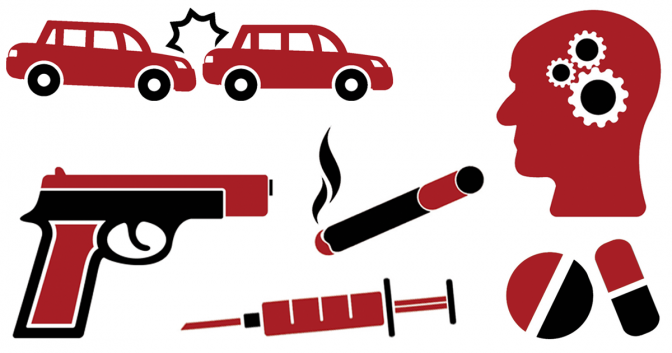The Five Biggest Marijuana Myths and How To Debunk Them

 MYTH 1: Legal Cannabis Is Responsible for the Opioid Epidemic
MYTH 1: Legal Cannabis Is Responsible for the Opioid Epidemic
Recent claims by the Trump administration that marijuana use is leading to the alarming rise in opioid abuse are not supported by the available evidence. In reality, numerous studies have found just the opposite.
Specifically, researchers have linked legal marijuana access to lower rates of opioid use and of hospitalization and mortality from it. A 2016 study by the University of Michigan reported that chronic-pain patients reduced their opioid use by 64% when cannabis became available.
In Israel, researchers found similar results in a cohort of patients with treatment-resistant pain, reporting a 44% reduction in participants’ opioid consumption after medical cannabis was introduced. That substitution can result in saved lives. In March, the authors noted in Drug and Alcohol Dependence that medical-marijuana legalization was associated with significant reductions in opioid-related hospitalizations.
Similarly, a 2014 study published in JAMA Internal Medicine determined that legalizing medical cannabis is associated with a reduction of as much as 33% in deaths attributable to the use of prescription opiates and heroin.
 MYTH 2: Consuming Marijuana Lowers Intelligence
MYTH 2: Consuming Marijuana Lowers Intelligence
The source of this often-repeated claim is a 2012 longitudinal study by Madeline Meier and colleagues that associated the persistent use of cannabis prior to age 18 with lower IQ in middle age. However, a separate review of that data, published in the same journal, Proceedings of the National Academy of Sciences, , disputed any direct link between cannabis use and declining IQ. It argued that Meier’s team had failed to properly control for potential confounding factors, such as subjects’ socio-economic status. After accounting for those variables, the author theorized that the true effect of early-onset cannabis use on IQ “could be zero.”
More recent longitudinal studies also dismiss the notion that cannabis use impairs IQ. A 2016 British study published in the Journal of Psychopharmacology assessed IQ and educational performance among a cohort of 2,235 marijuana-using teens and non-users. “[T]he notion that cannabis use itself is causally related to lower IQ and poorer educational performance was not supported in this large teenage sample,” the authors concluded.
In 2015, researchers at the University of California at Los Angeles and the University of Minnesota evaluated whether marijuana use was associated with changes in intellectual performance in two cohorts of adolescent twins. Participants were assessed for intelligence at ages nine to 12, before they had any involvement with marijuana, and again at ages 17 to 20. Investigators found no dose-response relationship between cannabis use and IQ decline. They also saw no significant differences in performance between marijuana-using subjects and their non-using twins.
“In the largest longitudinal examination of marijuana use and IQ change… we find little evidence to suggest that adolescent marijuana use has a direct effect on intellectual decline,” they concluded. “[T]he lack of a dose-response relationship and an absence of meaningful differences between discordant siblings lead us to conclude that the deficits observed in marijuana users are attributable to confounding factors that influence both substance initiation and IQ rather than a neurotoxic effect of marijuana.”
 MYTH 3: Cannabis Smoke Exposure Is More Damaging to the Lungs Than Tobacco Smoke
MYTH 3: Cannabis Smoke Exposure Is More Damaging to the Lungs Than Tobacco Smoke
While some studies have linked chronic marijuana-smoke exposure to higher instances of cough, phlegm and bronchitis, science has refuted claims that cannabis inhalation causes the sort of serious respiratory diseases commonly associated with smoking tobacco.
Specifically, the largest case-controlled study ever to investigate the respiratory effects of marijuana-smoking reported that it was not associated with lung-related cancers, even among subjects who reported smoking more than 22,000 joints over their lifetimes.
“We hypothesized that there would be a positive association between marijuana use and lung cancer, and that the association would be more positive with heavier use,” the study’s lead researcher, UCLA pulmonologist Dr. Donald Tashkin, stated in 2006. “What we found instead was no association at all, and even a suggestion of some protective effect” among marijuana-smokers—who had lower incidences of cancer than non-users.
Cannabis consumers can mitigate their exposure to the toxic gases produced by burning plant matter by using a vaporizer, which heats marijuana flowers to a point where cannabinoid vapors form, but below the point of combustion. Clinical studies assessing vaporization report that these devices all but eliminate subjects’ potential exposure to gaseous toxins and are “an effective and apparently safe vehicle for THC delivery.”
 MYTH 4: States with Regulated Marijuana Markets Experience Surges in Violence
MYTH 4: States with Regulated Marijuana Markets Experience Surges in Violence
Contrary to Attorney General Jeff Sessions’ claim that “there’s more violence around marijuana than one would think,” states that license the production and distribution of marijuana have not seen an uptick in violent crime. In fact, many jurisdictions have had less violent crime since legalization.
A 2014 study published by researchers at the University of Texas reported that the enactment of “medical-marijuana laws precedes a reduction in homicide and assault…. In sum, these findings run counter to arguments suggesting the legalization of marijuana for medical purposes poses a danger to public health in terms of exposure to violent crime and property crimes.”
A 2012 federally funded study published by UCLA researchers also reported that the proliferation of medical-cannabis retailers in urban areas “was not associated with violent-crime or property-crime rates.” It speculated that the dispensaries might actually reduce neighborhood crime, since many hire their own door security, have security cameras and take other steps to deter would-be criminals.
Data from states that regulate recreational marijuana sales yield similar results. In Washington, after voters legalized adult use in 2012, violent crime declined 10% statewide. In Colorado, which legalized adult use the same year, rates of violent crime and property crime dropped in Denver afterwards. Crime rates have similarly decreased in Portland, Ore., according to the libertarian Cato Institute. (Oregon legalized adult use in 2014.) Overall, Cato’s researchers concluded that concerns about legalization leading to more crime have largely been exaggerated.
 MYTH 5: Cannabis Legalization Is Linked to a Rise in Traffic Fatalities
MYTH 5: Cannabis Legalization Is Linked to a Rise in Traffic Fatalities
While some studies have found that THC-positive only drivers have a slightly higher risk of motor-vehicle accidents than drug-free drivers, it’s still significantly lower than the risk of accidents associated with driving after consuming alcohol. According to a study of 2,000 fatal crashes published in Injury Epidemiology in March, drivers who tested positive for alcohol were more than 10 times likely to have an accident than drivers who tested positive for THC. (Drivers who tested positive for both were more than 15 times as likely.)
Most importantly, data from states that have liberalized marijuana’s legal status show no uptick in motor-vehicle crashes. “[O]n average, medical-marijuana law states had lower traffic fatality rates than non-MML states,” researchers at Columbia University reported in the December 2016 issue of the American Journal of Public Health. “Medical-marijuana laws are associated with reductions in traffic fatalities, particularly pronounced among those aged 25 to 44…. It’s possible that this is related to lower alcohol-impaired driving behavior in MML-states.”
A 2011 assessment of traffic-fatality data from Colorado yielded a similar conclusion: Legal medical marijuana was “associated with a nearly 9% decrease in traffic fatalities, most likely due to its impact on alcohol consumption.”
In March, a Congressional Research Service report, “The Marijuana Policy Gap and the Path Forward,” concluded that there was “no trend identified in the percentage of drivers testing positive for marijuana,” either by itself or in combination with other drugs/alcohol, “for those involved in traffic fatalities and who were tested for drugs or alcohol” in Washington state after legalization. A similar review of motor-vehicle crash data by the Oregon Liquor Control Commission, issued in December 2016, noted that the “risk of crashes while driving under the influence of THC is lower than drunk driving.”
If you enjoyed this Freedom Leaf article, subscribe to the magazine today!

